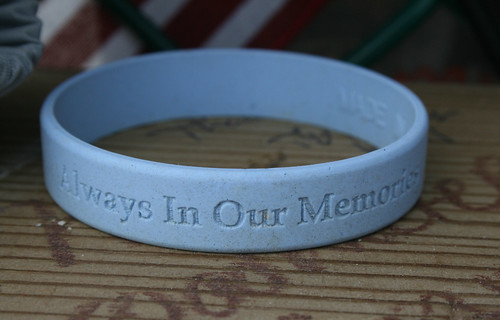As each anniversary passes, it feels more and more like borrowed grief. It seems almost ridiculous to recount where I was that day. I was safe. My family was safe. We were, in a word, untouched by what was happening.
And yet no one was untouched.
Or so we say as we all replay our role in that day in history. Where was I? I flew into Boston Logan an hour before some of terrorists flew out of that very airport. Does it matter? I was in no position to alter the course of history, nor were any of the other hundreds of people who walked the halls of that airport that morning, completely oblivious to the monsters walking amongst us. I wasn't in a position to become a hero. Was anyone who was in that airport that morning?
When air transportation was suspended for an extended time, I had no choice but to drive home to Pittsburgh. The horror I felt as I drove past a still smoking New York City was real, but was it my horror to feel? I didn't have any sort of close relationship with anyone who was there that day. I knew people who died that day, but they weren't people I had spent a considerable amount of time thinking about until they were gone. I wouldn't have even known the haze I saw while driving by was the lingering effects of nightmares-come-true if not for the images on television. The images on television made it all so real, even as it wasn't my reality. I felt changed, but I didn't really know how.
My first inkling that not everyone was changed in the same way smacked me in the face just hours after the planes crashed. As a co-worker went on and on about how terrible traffic would be because of people leaving New York City, I just stood there stunned. She declared that she was in no mood to sit in bumper-to-bumper traffic for hours and all I could think was about how lucky she was that traffic was her biggest worry at the moment.
But, really, what did I have to worry about? I was safe. My family was safe.
Weeks later, more reminders that not everyone had changed in the same way were written in the body language of people in airports. I was a road warrior in those days, constantly traveling all over the country for work. The difference in reactions was significant depending on where I was in the country. A walk through La Guardia felt like a walk through a field of landmines. The fear was real. It was at the surface. Meanwhile, a walk through a Houston airport was filled with complaints about new security measures. I know there were people who felt the effects of 9/11 in a very real way in every part of the world, but you wouldn't have guessed it just by standing back and observing sometimes. It was just different on the East Coast. Very, very different.
Today, even the words "Never Forget" sound different depending on who says them. Sometimes they are a plea, a desperate cry for the remembrance of a loved one. Sometimes they sound genuine as they come from the mouth of someone who clearly wants to use the lessons of that day as a impetus for change. They want politicians to work together, people to unite, and humanity to do more and be better. Sometimes, though, the words come across as a lecture. They are empty words being thrown by someone who thinks they have all the answers. "We need to . . . " or "The country should . . . " usually follow, but the people who use the words as a way to make themselves feel superior to these invisible people who have allegedly forgotten what happened that day are hurtful . . . mean . . . spiteful.
And, really, no one has forgotten. Anyone who was alive that day and old enough to understand any aspect of it remembers. We all remember. We all grieve.
Sometimes the grief is borrowed, but that doesn't make it any less real.
